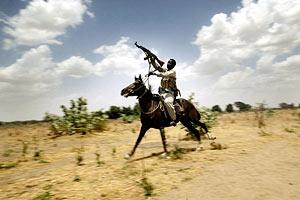Sudanese govt officials implicated in supporting Janjawid militias
NAIROBI, July 19, 2004 (IRIN) — Human Rights Watch (HRW) said on Monday it had
obtained documents showing that Sudanese government officials had directed
the recruitment, arming and support for Janjawid militias in the country’s
western region of Darfur.
 The confidential documents, obtained from the civilian administrations in
The confidential documents, obtained from the civilian administrations in
Northern and Southern Darfur, implicated high-ranking government officials
in “a policy of militia support”, HRW added in a news statement.
The government of Sudan has admitted arming the militias to fight a
rebellion in the region, but has consistently denied supporting them with
its army, and has never accepted responsibility for the widespread human
rights abuses they have committed. It was not possible to immediately get
a comment from the government on the HRW report.
HRW and other groups have accused the militias and Sudanese government
forces of being responsible for crimes against humanity, war crimes and
ethnic cleansing involving aerial and ground attacks targeting civilians.
President Umar Hasan al-Bashir has accused Western media of a campaign of
lies regarding Darfur, saying that accusations of “ethnic cleansing” by
some Western media were “sheer fabrications and baseless”.
“It’s absurd to distinguish between the Sudanese government forces and the
militias: they are one,” said Peter Takirambudde, the executive director
of HRW’s Africa division. “These documents show that militia activity has
not just been condoned, it’s been specifically supported by Sudan
government officials.”
A series of official Arabic-language documents dating from February and
March 2004 showed officials calling for the recruitment of and military
support for Janjawid, to be delivered to known Janjawid leaders, camps and
“loyalist tribes”, HRW reported.
A February directive ordered “all security units” to tolerate the
activities of known Janjawid leader Musa Hilal in Northern Darfur, it
said. Hilal is one of seven Janjawid leaders and coordinators named by the
US government last month.
The documents “highlight the importance of non-interference so as not to
question their authority” and authorised security units to “overlook minor
offences by the fighters against civilians”, HRW continued.
Another document called for a plan of resettlement of nomads into places
from which “the outlaws [i.e. the rebels]” had “withdrawn”.
Over 1.2 million people have been displaced by the militias and the army
in joint attacks against civilians, many of whom share the same Fur,
Zaghawah and Masalit ethnicity as Darfur’s rebels.
“This along with recent government statements that displaced persons will
be settled in 18 settlements rather than in their original villages raises
concerns that the ethnic cleansing that has occurred will be consolidated
and that people will be unable to return to their villages,” said HRW.
“Sudan has launched a major public relations campaign aimed at buying more
time for diplomatic initiatives to work,” said Takirambudde. “But at this
pint and without new evidence, Khartoum has zero credibility.”
Following a visit to Darfur by UN Secretary General Kofi Annan, the
Sudanese government committed itself to the following on 3 July: to
immediately disarm the Janjawid militias and other “armed outlaw groups”;
to ensure that no militias are present in areas surrounding camps for
displaced; to deploy a “strong, credible and respected” police force in
all internally displaced persons (IDPs) areas and others “susceptible to
attacks”; to ensure that all movement of IDPs to their homes is done in a
“truly voluntary manner”; and to undertake “concrete measures” to end
impunity.
Earlier this month, the Sudanese interior minister and the government’s
special representative for Darfur, Abd al-Rahim Muhammad Husayn, told
reporters that his “main duties” included securing and protecting the
people of Darfur either in their camps or in their villages.
He said he was deploying 6,000 policemen to maintain security
“everywhere”, and that he would disarm the Janjawid. “We will disarm them,
we will try them so we can protect the people,” he said.
But an increasing number of reports suggest that the Janjawid are merely
being absorbed into the new police forces, the paramilitary Popular
Defence Forces and the army, all being deployed by the government to
“protect” civilians in Darfur.
